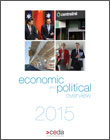Explore our Progress 2050 Goal Tracker
03/03/2015
“Global oil prices have halved in the last six months … and this comes just as our LNG exports are starting to pick up.
“Neither of these developments is good for us because they destroy in some way our national income.
“Already we’ve seen two years of our national income fall in real terms simply because of these commodity price changes.
“The government sector will help a little bit here to pick up some of the slack.”
Ms Murphy said that while government spending is flat at the moment, there is a little bit more activity in the infrastructure space.
“They are backing capital projects (and) putting a little bit of money into getting things going,” she said.
“We will see some of these major projects grow (spending) from about $6 billion a year to about $12 billion over the next couple of years.”
Despite this, Ms Murphy said that it will not be enough to make up for the drop in commodity prices.
Commodity export volumes increase
“Iron ore export volumes are well and truly on their way up,” Ms Murphy said.
“Queensland coal export volumes have been growing strongly as well.
“And we’re just on the brink of the LNG exports starting to pick up very strongly … and that will become a major positive for the Australian economy in the sense that our export numbers and our GDP will look great.
“The problem of course is the price that we are getting for these commodities.”
Loss of momentum in global economy weighs on business confidence in Australia
There is a dip in business confidence globally, Ms Murphy said.
“A dip in business confidence is the last thing we need right now,” she said.
“This is because we have a major weight on the Australian economy right now, which is the downtown in the major projects construction.”
From 2011, when the commodity prices began to fall, “you started to see a lot of projects getting cancelled that were no longer viable,” she said.
“The projects that were being constructed are finished, or being finished, and at the same time, commodity prices are not rising anymore so the incentive to build new ones is not there.
“So we have this downtown in business investment in Australia happening at the moment.”
Higher spending needed in non-mining sectors
“What we need is the rest of the economy – the non-mining sectors – to start spending money,” Ms Murphy said.
“Firms are not using up their spare capacity and it’s particularly bad in Queensland.
“So there’s just not a lot of momentum in the business sector at the moment.
“In part, we think this has probably got a little bit to do with the political environment.
“It has also got a lot to do with consumers who don’t seem to be particularly confident and are not willing to go out and start spending money.”
Slow and weak economic rebalancing
Also speaking at the CEDA event, Fairfax Media Group markets and economy reporter, Mark Mulligan, said: “The economic rebalancing as resources investment wound down has been slower and weaker than hoped for.”
“(It has been) held back by the faltering business confidence, by sluggish global demand and by the strength of the Australian dollar until now.
“Lower petrol prices and lower interest rates should be boosting consumer sentiment.”
“However, job insecurity and wage growth restraints are undermining these windfalls.
“Consumers … are not prepared to go out and spend that extra bit of money.
“Business leaders and private sector economists have begun to ascribe the current confidence crisis to the political environment.”
 CEDA's Economic and Political Overview
CEDA's Economic and Political Overview
CEDA's Economic and Political Overview (EPO) is Australia's premier publication and series of briefings on the Australian economy and politics for the year ahead. Running for more than 30 years, the EPO brings together political, economic and business leaders and provides CEDA members with business intelligence on the environment they will be operating in over the next 12 months.
CEDA's 2015 EPO will provide economic and political forecasts and also examine funding options from the finance sector and some proposed market-based reforms and equity issues in Australia.
Download 2015 EPO publication (pdf)
Find our more about CEDA's EPO or read articles and watch videos from EPO events.
